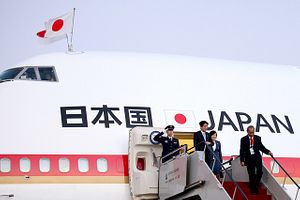Japan and China have continued to circle each other since late summer, in signs that improved bilateral ties might lead to an overall drawdown in tension between Asia’s two largest economies, and which would symbolically be enshrined in a meeting of their two leaders at the upcoming APEC summit in Beijing next month. Diplomatic contact has continued over the past week, with several issues that have been in limbo for years showing signs of progress, or at least the appearance of progress. The real question is whether the last several weeks of progress has just been building in order to allow the two leaders to meet, or if their meeting will be an outgrowth of an overall trajectory toward improved relations.
For Japanese Prime Minister Shinzo Abe, there is a real political bonus in finally meeting with Chinese President Xi Jinping, as his nationalist policies have isolated Japan from its neighbors. For Xi, a meeting would have less tangible benefits for him personally, although it could signal that he has the political capital to meet with Abe, indicating a successful consolidation of his power after months of high-level purges. However, for both countries a drawdown in tension and the resumption of normal ties (which a meeting between Xi and Abe would represent) would likely have significant economic benefits, as overall trade and Japanese investment have fallen noticeably since their troubles began in August 2012.
Three separate issues have seen progress in the last week. The first and arguably most important is the resumption of talks over the possibility of establishing a hotline between both countries’ militaries, in order to prevent unwanted and unintended exchanges, particularly around the disputed Senkaku/Diaoyu Islands. The idea of a hotline was actually initiated during Abe’s first premiership in 2007, after which an agreement was reached in June 2012 on three overarching issues: “the hotline would connect their defense chiefs, discussions would be held regularly, and a common language and radio bandwidth would be set up to enable aircraft and ships to contact each other on site.”
The talks broke down after Japan’s government purchased the islands, yet last month both sides agreed to reopen them, with Japanese officials telling the Nikkei that they have proposed holding the talks by the end of October, specifically before the APEC Summit, in order to gauge Chinese commitment on the issue. The talks would likely not settle the issue immediately – a high-ranking JSDF official said “we want to see how China reacts to the proposal.”
The second issue to see progress has to do with the resumption of lawmaker exchanges, suspended since January 2012. Ichiro Aisawa, head of the Japanese Lower House steering committee, led a delegation of lawmakers to Beijing on Monday and met with the vice chairman of the National People’s Congress Standing Committee, Zhang Ping, and the panel’s secretary general Cao Wizhou. Aisawa said the Chinese side wants to resume contact through “mutual efforts,” and will send a group of lawmakers when the timing is right. Aisawa was much more direct on the Japanese timetable, telling reporters Japan wants the exchange to resume “by the end of this year or March next year, at the latest,” according to the Japan Times.
Finally, Japan is considering reforming its visa policy with a small segment of Chinese travelers in order to boost trade and investment as well as promote a better impression of Japan. “Informed sources” told the Jiji Press on Sunday that the Foreign Ministry “is considering easing requirements for issuing multiple-entry visas to wealthy Chinese,” as well as “Chinese people well-versed in Japan, such as those who teach Japan-related subjects.” The plan would only affect a relatively small percentage of visa seekers, given that only 45,044 of 970,000 visas issued last year were for multiple entries. However, that number has tripled over the last five years, with Japan seeking to target this lucrative and predisposed contingent as a small part of its overall plan to improve relations.
China has shown positive indications on most bilateral issues recently, but with no commitment to firm timelines or benchmarks for progress. In the first two cases, Japan is waiting on movement from China, as Beijing appears to possibly be waiting for either more Japanese concessions or perhaps a better mood on the issue domestically. The ability to officially reopen the talks for a defense hotline before the November summit in Beijing would be a key benchmark. However, if the issue remained unsettled, it would likely be a sign that Beijing is looking for additional concessions from Tokyo at the summit before committing to a further détente.































